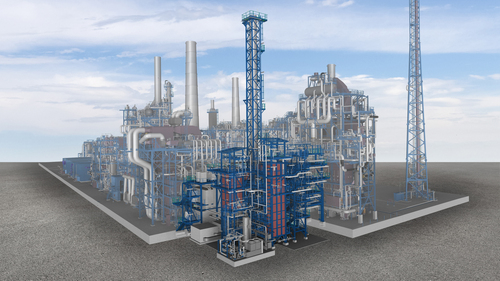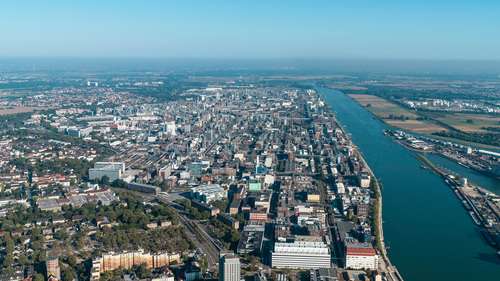BASF, SABIC and Linde start construction of the world’s first demonstration plant for large-scale electrically heated steam cracker furnaces at Ludwigshafen, Germany
- Demonstration plant with 6 megawatts input of renewable electrical energy to be fully integrated into a steam cracker at BASF’s Ludwigshafen Verbund site
- Technology has the potential to reduce CO2 emissions by at least 90% compared to conventional steam crackers
- Project has been awarded funding by the German Federal Ministry for Economic Affairs and Climate Action
- Start-up of the demonstration plant is targeted for 2023
BASF, SABIC and Linde have started construction of the world’s first demonstration plant for large-scale electrically heated steam cracker furnaces. By using electricity from renewable sources instead of natural gas, the new technology has the potential to reduce CO2 emissions of one of the most energy-intensive production processes in the chemical industry by at least 90% compared to technologies commonly used today.
The demonstration plant will be fully integrated into one of the existing steam crackers at BASF’s Verbund site in Ludwigshafen, Germany. It will test two different heating concepts, processing around 4 tons of hydrocarbon per hour and consuming 6 megawatts of renewable energy. The start-up of the demonstration plant is targeted for 2023.
BASF and SABIC are investing together into the project and the demonstration plant will be operated by BASF. Linde is the engineering, procurement and construction partner for the project and in the future will commercialize the developed technologies.
To support the development of the novel furnace technology, the project has been granted €14.8 million by the German Federal Ministry for Economic Affairs and Climate Action under its “Decarbonization in Industry” funding program. The program is supporting energy-intensive industries in Germany in their efforts to achieve carbon neutrality.
“BASF’s mission is to achieve climate neutrality, and electrification of the hugely energy-intense steam cracker is a significant milestone in our transformation journey towards net zero,” said Dr. Martin Brudermüller, Chairman of the Board of Executive Directors of BASF SE. “We are proud that BASF has been granted project funding by the German Federal Ministry for Economic Affairs and Climate Action, as it is a testament to the support of our approach also by policymakers.”
Yousef Al-Benyan, Vice-Chairman and CEO of SABIC said: “Our vision is to transform our business and to help address urgent global challenges through efficient carbon management. This project holds huge potential for all of the petrochemical industry around the world in our drive for low carbon emitting processes. With the milestone we are jointly announcing today on the start of construction, we hope that our three-party collaboration can inspire many more collaborations that ultimately bring the world to net-zero greenhouse-gas emissions through a circular carbon economy.”
“This project demonstrates how global companies can successfully collaborate by combining their expertise in technology development, engineering, procurement and construction execution and operation. The timely delivery of the demonstration plant will be a major milestone on the path to making sustainable solutions available to the petrochemical industry. We are proud to be part of this breakthrough project,” said Jürgen Nowicki, Executive Vice President Linde plc and CEO of Linde Engineering.
The demonstration plant aims to show that continuous olefin production is possible using electricity as a heat source. The plant is designed in a way that two heating concepts can be tested in parallel: Direct heating applies an electric current directly to the process tubes inside the reactor; indirect heating uses radiative heat of heating elements placed around the tubes. Testing these two concepts will make it possible to react flexibly to different customer and site requirements.
Steam crackers play a central role in the production of basic chemicals and require a significant amount of energy to break down hydrocarbons into olefins and aromatics. Typically, the reaction is conducted in furnaces at temperatures of about 850 degrees Celsius. Today these temperatures are reached by burning fossil fuels. The project aims to reduce the CO2 emissions by powering the process with electricity.
Categories
Investments
Countries
Companies
Latest news
Ports of Duisburg and Rotterdam advance energy transition together
Port of Rotterdam →With this LoI, the two major European logistics hubs reinforce their goal of jointly developing sustainable transport corridors via waterways as well as future-oriented initiatives for the energy t...
BASF constructs new electronic grade ammonium hydroxide plant in Ludwigshafen
BASF SE, Ludwigshafen →State-of-the-art facility to support the development of the advanced European semiconductor industry. New capacity meets growing demand for the manufacturing of chips in Europe
SynPet Technologies to bring emerging technology in plastics recycling to the Port of Antwerp-Bruges
Port Of Antwerp →SynPet Technologies is investing €300 million in an innovative facility that converts all types of plastics into a circular naphtha substitute without pre-treatment and with efficient conversion ra...
NEXTCHEM awarded a feasibility study by Mana Group and Equinor for the production of sustainable fuels in Norway leveraging its NX Circular™ technology
With the support of NEXTCHEM, Mana (NG Nordic) and Equinor are entering an early-stage strategic partnership to explore the potential development of the Nordics' first large-scale waste-to-methanol...




